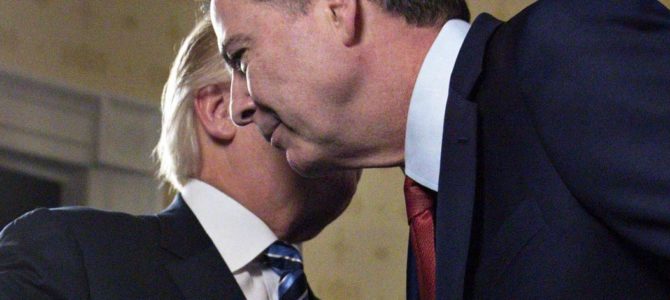
According to former FBI Director James Comey’s statement to the Senate Intelligence Committee, released Wednesday before his testimony, it was Comey himself who initiated the practice of meeting privately with Donald Trump. The first encounter he describes in the seven-page statement was a briefing with then President-elect Trump at Trump Tower January 6. Here are the relevant parts of the description, which is on page one of the statement:
I was there with other Intelligence Community (IC) leaders to brief him and his new national security team on the findings of an IC assessment concerning Russian efforts to interfere in the election. At the conclusion of that briefing, I remained alone with the PresidentElect to brief him on some personally sensitive aspects of the information assembled during the assessment…
The Director of National Intelligence asked that I personally do this portion of the briefing because I was staying in my position and because the material implicated the FBI’s counter-intelligence responsibilities. We also agreed I would do it alone to minimize potential embarrassment to the President-Elect. …
[P]rior to the January 6 meeting, I discussed with the FBI’s leadership team whether I should be prepared to assure President-Elect Trump that we were not investigating him personally. That was true; we did not have an open counter-intelligence case on him. We agreed I should do so if circumstances warranted. During our one-on-one meeting at Trump Tower, based on PresidentElect Trump’s reaction to the briefing and without him directly asking the question, I offered that assurance.
Since Trump fired Comey, much of this story has centered on Trump’s inappropriate behavior in meeting one-on-one, in private, with his FBI Director about the ongoing Russia investigation, even dismissing other aides and officials to ask Comey for assurances that he was not under investigation. In his statement, Comey reveals that the first time he ever met with Trump, he met with him one-on-one, in private about the ongoing Russia investigation, even dismissing other aides and officials, to assure him he was not under investigation.
Knowing that, it becomes less surprising that Trump might have thought that’s how the two of them were doing business. That doesn’t mean Trump’s behavior was right. He should have known that meeting privately with Comey on these matters as President-elect was different than meeting with him as President. The propriety and power balance changed after he officially became Comey’s boss. But it fits with what we know of the two men that Comey might make that distinction but Trump wouldn’t.
Further, we all know that Comey’s self-conception is as the last Boy Scout in Washington. It’s a tale that works for him, and he is often given unquestioning credit for honesty and impeccable morals in all his professional conduct. Frankly, I’m inclined to trust him more than Trump. But in their desire to nail Trump, many have assumed Comey has no motivations of his own other than truth, justice, and the American way.
But Trump wouldn’t have assumed that of Comey. Trump might have assumed that a powerful guy coming to meet with him, dismissing a bunch of other powerful people from the room, and revealing he has intelligence about some really salacious, potentially embarrassing personal allegations against the president-Elect was sending a bit of a Tony Soprano message of his own. At the very least, Trump may have reasonably assumed that in the future, when he wanted to discuss the ongoing Russia investigation and ask about whether he was under investigation, he should do that alone with Comey, as Comey had illustrated that’s exactly how he does that exact thing.
If you subscribe to the theory that most of Trump’s inappropriate behavior comes from ignorance of the lines he’s crossing, a Washington newbie engaging in “New York City talk,” it makes some sense he’d assume from Comey’s behavior that they were going to have a more “New York City” relationship than Comey did.
None of this makes Trump’s behavior good. He’s an impulsive, undisciplined person not interested in figuring out where the lines are and observing them. And he was understandably frustrated, particularly about the now-discredited, salacious allegations against him, which were aired in the national media. The argument for his ignorance of and disregard for ethical lines is an unflattering one that doesn’t exonerate him. But it’s a plausible case, different from the prevailing narrative, and it’s supported by Comey’s version of events.








